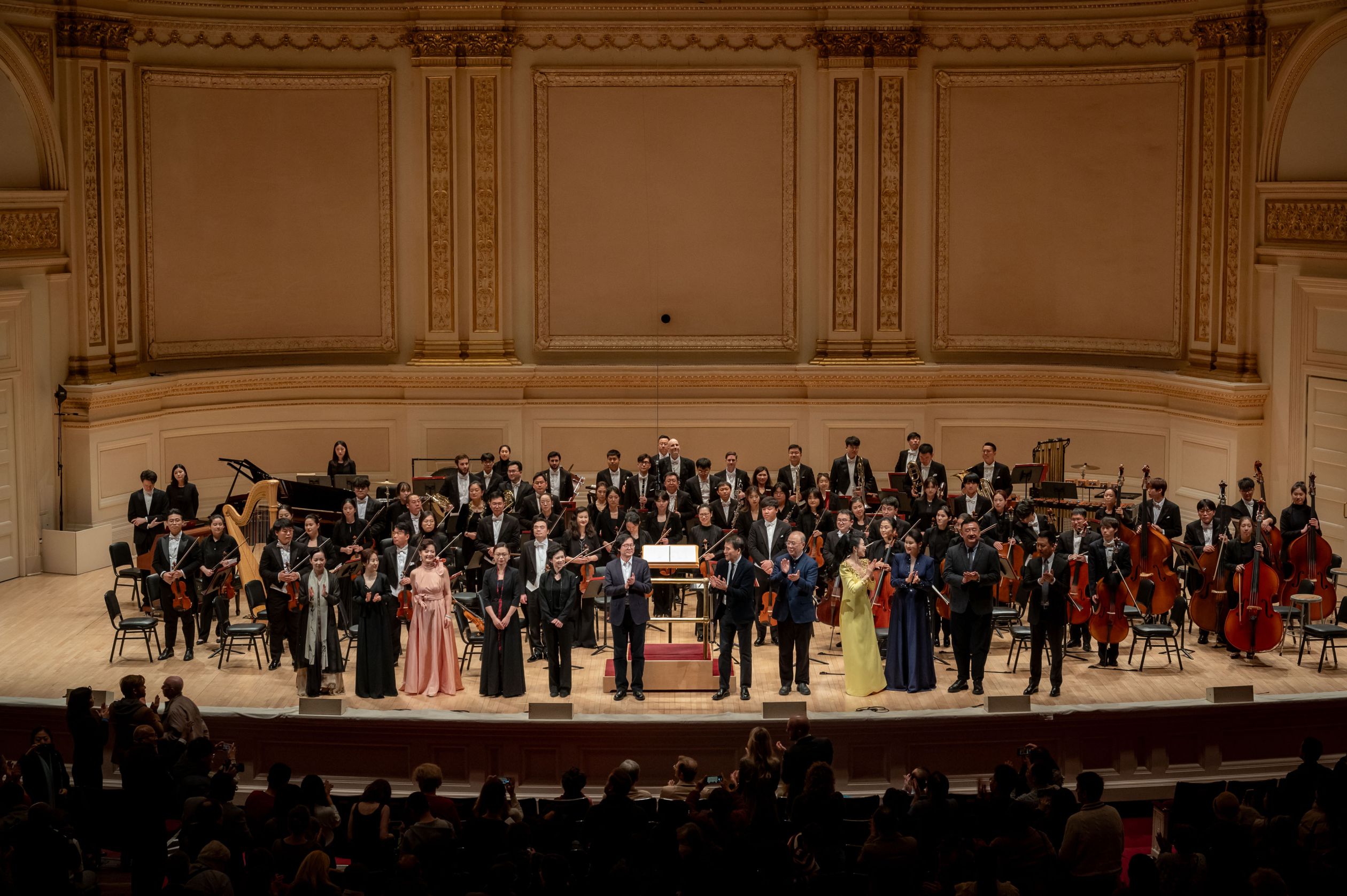Central Conservatory Symphony Orchestra Elevates Carnegie Hall with Eight Premiere Chinese Compositions

Landmark Performance Celebrates Fusion of East and West, Showcasing Diverse Compositional Styles and Cultural Harmony at Historic Carnegie Hall on November 24th, 2023
New York, NY, 29th Nov 2023 – On the night of November 24th, 2023, the audience at the nearly packed Carnegie Hall in New York stood up and applauded for a long time for the excellent works of the composers of the Central Conservatory of Music, and for the wonderful performances of the Central Conservatory of Music Symphony Orchestra and the young artists. This is the first Chinese orchestra to visit the U.S. after the Summit Meeting between Chinese and U.S. Presidents in San Francisco and marks the return of the CCOM Symphony Orchestra to Carnegie Hall following its previous debut in 2019. More than 2,000 audience members attended the concert on the night of “Black Friday”.

Under the baton of renowned conductor Prof. Chen Lin, the Symphony Orchestra of the Central Conservatory of Music, together with outstanding young singers and instrumentalists, successfully gave the world premiere of concertos and orchestral works newly written by eight composers of the Central Conservatory of Music.
The Central Conservatory of Music, Beijing, is China’s top music school, producing a large number of musicians who are renowned both at home and abroad, including renowned pianists Lang Lang and Wang Yuja, who are familiar to U.S. audiences, and composers Tan Dun, Chen Yi, Zhou Long, Ye Xiaogang, Guo Wenjing, and Qin Wenshen, among others. As a center of Chinese music creation, many masterpieces of Chinese music have come from the school, which is an important driving force in the development of Chinese music.
The eight composers in this concert have made various new attempts and explorations in the realm of music and art. Some of these works combine Chinese musical instruments with Western orchestra, integrating Chinese musical elements with Western modern musical language and techniques, and deeply explaining the simple wisdom and cultural connotation of Chinese philosophy and aesthetics; some draw inspiration from Chinese classical poems, expressing the beautiful mood and rich emotions of poetry; and some, with unique harmonic language, elegant and subtle changes of orchestral timber to express human’s exploration and curiosity for ancient and unknown things in the new century; some use unique harmonic language, elegant and subtle orchestral timbre changes to express mankind’s exploration and curiosity for ancient and unknown things, as well as concern for nature in the new century; some explore the future world, full of beautiful hope, fantasy and imagination.
The concert opened with Ye Xiaogang’s The Faint Ginkgo, a latest in the composer’s series of works based on plants. The structure of the work is characterized by the composer’s own individuality. The emphasis on the change of color and fullness of sound in the music creates an emotional atmosphere of the composer’s feelings for nature.
Chang Ping’s Violin Concerto “The Realm of Future” (Jiajing Wang, violin), with its unique musical language, brings fantasy, lyricism, and violin technique into full play. In many passages of the work, the overtones of the violin in the very high register and the granularity of the percussion create a certain dappled color of light and shadow. The work has a gorgeous and extremely difficult cadenza section, with complex harmonic weaving.
Jia Guoping’s Eternal River for Guzheng, Harp and Orchestra (Guzheng: Su Chang, Harp: Wang Guan) is a work in which the composer musically expresses the splendor, conflict, struggle and breakthroughs that occur in the flow of time and space. The work intertwines and dialogues the harp and guzheng, two plucked string instruments with completely different cultural meanings.
Guo Wenjing’s The Short Poem in March for soprano and orchestra (sung by Song Yuanming) features lyrics chosen from a poem by Haizi. Among the composer’s vocal works for contemporary poetry, this is a particularly impressive one, with its poignant and unclichéd melody, its long, uninterrupted tessitura, the whispers of viola and flute in the bass register. The overall tone of the work is one of deep lamentation, and its introverted and restrained emotion is precisely what makes it all the more haunting. The work has a meaningful and evocative ending.
In the second half, Qin Wenchen’s bamboo flute concerto ” Cang Shan Xu” (Bamboo flute: Fan Linfeng) expertly uses the ” defamiliarization” to treat the familiar timbre of the instrument, while at the same time presenting the unique cultural charm of the Chinese bamboo flute, which is light and translucent, with the motivated and gorgeous vibrato for “show-off”. As in many of the composer’s recent works, the change of timbre becomes the driving force for the development of the work, and the long lines of vibrato emphasize the tension of the sound.
Tang Jianping’s “The Stone in Five Colors” is inspired by the “five color stone” used by Nuwa to mend the sky, an ancient Chinese Myth. The music is rich in drama, sometimes moving back and forth with twists and turns, and sometimes erupting with a rainbow-like momentum. The percussion is accompanied by string, brass, and occasional pizzicato on violin, and the use of ornamental glissandi and “pointillism” emphasizes the tension and uncertainty of the music.
Hao Weiya’s symphonic poem for mezzo-soprano and orchestra, You Are My Left Hand (sung by Shi Lin), is a collaboration between the composer and contemporary Chinese poet Pan Geng. In this work, the mezzo-soprano voice acts as an “instrument” in concert with the orchestra, playing multiple roles and allowing the music to reveal multiple distinct musical images. The work, as a whole, seems to create an emotional atmosphere – a journey towards light and relief in the midst of suffering.
The final piece of the concert was Zhang Shuai’s East-West III: Tao for All, inspired by the Tao Te Ching. The work tries to present the different aesthetics of the East and the West, and through the rich variety of musical motives, it presents a grand momentum in the whole, with a strong sense of picture and narrative.
Full of Chinese cultural elements, these pieces combined traditional Chinese instruments with a symphony orchestra setting, and Chinese musical elements with Western techniques of composition.
The concert also demonstrated the high professionalism and strength of the musicians of the Central Conservatory of Music, who excelled in the interpretation of the music, presenting the individual characteristic of the eight works in very different styles, and were highly praised by the audience. Outstanding singers Song Yuanming and Shi Lin, through their excellent control of their voices and delicate handling of the works, well grasped the composer’s intentions and the demands of the works on lyrics and music, and sang very well. Outstanding young violinist Wang Jiajing, guzheng artist Su Chang, harpist Wang Guan, and bamboo flutist Fan Linfeng demonstrated excellent playing skills and an accurate grasp of the work, which played an important role in the successful staging of the work. It is especially worth mentioning that the Symphony Orchestra, under the baton of conductor Chen Lin, conquered the audience with its delicate and layered treatment, and its passionate yet introspective performance.
Professor Susan Leslie Boynton, Dean of the Music Department at Columbia University, spared no words of praise for the concert, which, in her opinion, was not only characterized by very distinctive works, but also by a rich variety of compositional styles. The overall level of the concert was very high, and she was impressed by the composer’s handling of the poetry and music, the vocals and the orchestra, as well as the singers’ expression of emotion and wonderful interpretation of the poetry. Stephen Jones, former dean of the School of Arts and Communication and professor of composition at Brigham Young University, who traveled from Utah to New York after a few hours on a plane, spoke highly of the composer’s skillful and delicate way of blending Chinese and Western musical elements in his work. An American composer who has studied in China said that these new works are very exciting. It’s great to see how creative all the composers are, and the music is beautiful and vibrant and exciting. The performers are also top notch. Lin Chen is an excellent conductor. Awesome!
Former Idaho Senator Brent Hill said, “I love the diversity of this concert, especially the combination of the Western instrument, the harp, and the Chinese instrument, the guzheng, which symbolizes the fusion of East and West, and I really felt the energy that fills the music. Dionisio Cimarelli, an adjunct sculpture professor at the Fashion Institute of Technology in New York who has lived and worked in China for many years, said that music helps to build bridges of understanding between China and the U.S., and that we need more understanding and cooperation to create a better world together.
Media Contact
Organization: Central Conservatory of Music
Contact Person: Tao Qian
Website: https://video.ccom.edu.cn/
Email: Send Email
Country: China
Release Id: 2911238047
